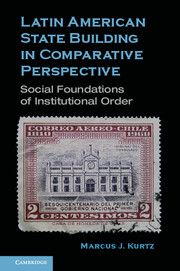Book contents
- Frontmatter
- Contents
- Acknowledgments
- 1 The Difficulties of Studying State Building
- 2 The Social Foundations of State Building in the Contemporary Era
- 3 State Formation in Chile and Peru
- 4 State Formation in Argentina and Uruguay
- 5 Divergence Reinforced
- 6 The Social Question and the State
- 7 Conclusions, Implications, and Extensions
- References
- Index
4 - State Formation in Argentina and Uruguay
Agrarian Capitalism, Elite Conflict, and the Construction of Cooperation
Published online by Cambridge University Press: 05 February 2013
- Frontmatter
- Contents
- Acknowledgments
- 1 The Difficulties of Studying State Building
- 2 The Social Foundations of State Building in the Contemporary Era
- 3 State Formation in Chile and Peru
- 4 State Formation in Argentina and Uruguay
- 5 Divergence Reinforced
- 6 The Social Question and the State
- 7 Conclusions, Implications, and Extensions
- References
- Index
Summary
This chapter marks a move away from an exploration of the polar differences highlighted in the comparison between the dynamics of state building in Peru and Chile. In that context, a continental laggard stood in sharp contrast to likely the best performer in the region. Here a more subtle distinction is made in the contrasts within and between the Argentine and Uruguayan cases. Both countries quite belatedly initiated successful state strengthening trajectories in the postindependence period after almost a half-century of severe internal conflict. To do so, they each had to overcome long-standing elite divisions that prevented political cooperation, and they accomplished this in very different ways; through a definitive victory of one side in Argentina and quite differently through the construction of institutions of power sharing in Uruguay. The state strengthening trajectories that ultimately emerged would, however, diverge as each country faced the second critical juncture coming as a consequence of the initial entry of the middle and working classes into politics; this is an outcome that will be explored in Chapter 6. For the present, however, the contrasts within and between these cases highlight the centrality of elite politics as one of the two principal initial determinants of long-term national political development.
As a matter of research design, there are two broad sets of theoretically important comparisons to be made here. First, in each case, a long period of severe interelite conflict was associated with very little success in the construction of national political institutions. And then, over the course of decades, ultimately successful elite coordination and compromise made possible the initiation of a trajectory of political development in each. But in the Argentine case, it was a form of elite cooperation that had its birth in the force of arms, making lingering reluctance and regional resistance facts of life even as national political institutions took hold. In Uruguay, elite compromise was a pacted outcome negotiated between contending political parties that ultimately produced a quasi-consociational outcome that would undergird the collective dominance of these very same parties over the subsequent century. It also produced a remarkable level of institutional development and societal penetration by the state in a polity that began the era of independence in a nearly ungovernable form. The comparisons over time help to hold constant the distinctive features of each country that might have affected the outcomes, while the cross-national variation allows a further investigation of the implications of the means by which elite cooperation is achieved for institutional development.
- Type
- Chapter
- Information
- Latin American State Building in Comparative PerspectiveSocial Foundations of Institutional Order, pp. 95 - 130Publisher: Cambridge University PressPrint publication year: 2013



